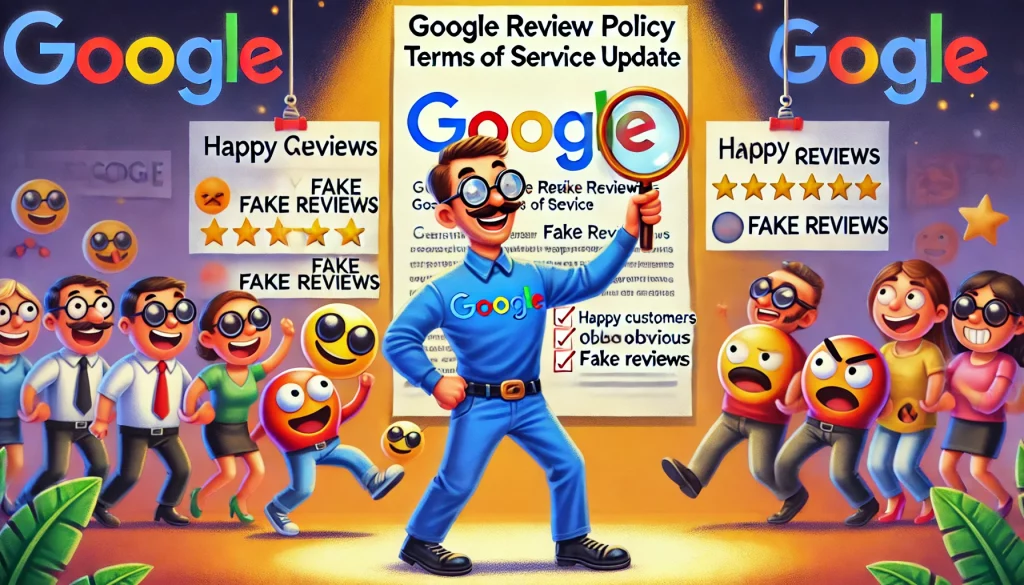Google Review policy update: Enhanced transparency, improved compliance

Understanding Google’s review policy
Google is the preeminent platform for online reviews, commanding over 79% of all internet-based evaluations. For sectors such as healthcare, retail, legal services, and home services where location is key, this figure escalates to more than 90%.
This dominance highlights the critical role Google reviews play in shaping business reputations and consumer decisions. According to a study by BrightLocal, 87% of consumers read online reviews for local businesses in 2020, and this number has only increased in recent years.
Google’s review policies mandate that all reviews must be based on genuine personal experiences, directly related to the business, and expressed respectfully. Importantly, businesses are prohibited from offering incentives in exchange for reviews to ensure that all feedback remains honest, helpful, and authentic. According to BrightLocal, 91% of consumers regularly or occasionally read online reviews, emphasizing the necessity of maintaining transparent and genuine feedback.

Key requirements of Google’s review policy
The revised Google Terms of Service (TOS) now include a clause that mandates businesses to request reviews from all customers, regardless of their experience being positive or negative. Google also emphasizes the importance of soliciting reviews individually rather than in bulk, to avoid the appearance of manipulation. Key updates include:
Businesses should not discourage or forbid negative reviews or cherry-pick customers for positive reviews. According to ReviewTrackers, 94% of consumers say a bad review has convinced them to avoid a business.
Google advises against requesting reviews from multiple customers simultaneously.
Strategies for compliant review acquisition
Encourage authentic reviews
Emphasize the importance of feedback based on direct customer experiences. Avoid any form of compensation for reviews to comply with Google’s strict guidelines.
Simplify the review process
Provide clear instructions and accessible links to your Google Business page, possibly using QR codes to direct customers straight to your review platform. According to a study by ReviewTrackers, 63% of consumers are likely to check online reviews on Google before visiting a business, making it crucial to streamline the review process.
Optimal timing for review requests
Ask for reviews post positive interactions, using follow-up communications like emails or texts that include direct links to your review page. Research by Podium shows that 70% of consumers will leave a review if asked.
Engage with all reviews
Show appreciation for feedback by responding to every review, regardless of its nature. This engagement demonstrates commitment to customer service and can enhance customer satisfaction.
A Harvard Business Review study found that businesses responding to reviews see a 12% increase in review volume.
Monitor and manage review content
Regularly check your reviews for any that violate Google’s standards, such as spam or fake reviews, and report them as necessary. According to a study by Uberall, 67% of consumers say they’ve seen fake reviews in the past year, highlighting the importance of authenticity.
Educate your team
Ensure all staff are familiar with Google’s review policies and understand how to solicit reviews responsibly. Training programs can help ensure consistency and compliance across the organization.

Prohibited practices in Google reviews
False reviews: Creating or soliciting fake reviews is strictly forbidden. This includes reviews by those who have not used the product or service or those written under a conflict of interest, such as by employees or relatives.
A study by BrightLocal found that 62% of consumers think they have seen a fake review for a local business in the past year.
Incentivizing positive feedback: Offering rewards for positive reviews is a violation of Google’s policies and can lead to severe consequences, including legal action from regulatory bodies like the FTC.
Content violations: Posting or allowing inappropriate content, including fake, biased, or offensive reviews, is prohibited. Review gating, or soliciting feedback only from satisfied customers, is also banned.
Consequences of non-compliance
Ignoring Google’s review guidelines can lead to significant repercussions such as review removal, account suspension, or complete listing disablement, impacting your business’s online visibility and reputation. Legal risks also apply, especially with practices like review manipulation.
According to a study by Moz, online reviews account for 15.44% of how Google ranks a local business.
FAQs on Google reviews
Reporting fake reviews: You can report suspicious reviews through your Google Business account by selecting the “Flag as inappropriate” option. According to ReviewTrackers, 82% of consumers read online reviews for local businesses, making it crucial to maintain their integrity.
Asking for reviews: It’s permissible and advisable to ask all customers for reviews to ensure authenticity and compliance with Google’s standards.
Handling abusive reviews: Report abusive content directly to Google, which adheres to strict guidelines to maintain a respectful and safe environment for all users.
Legal implications: Be aware of legal regulations, like those from the FTC, which can affect how reviews must be handled and disclosed.

Expert opinions on Google review policy
Mia Wang, social media strategist: “Google’s stance on not soliciting reviews in bulk aligns with broader digital marketing trends focusing on personalized customer engagement. Brands should see this as an opportunity to deepen relationships rather than a hurdle in gathering reviews.”
Carlos Gomez, tech entrepreneur: “The introduction of a direct contact button for customers to express concerns is a game-changer. It not only aids in immediate conflict resolution but also helps businesses manage potentially damaging reviews by addressing issues before they escalate.”
Rachel Holmes, customer insights analyst: “By enforcing a policy that all customers are asked for reviews, Google ensures that data collected will offer a more accurate reflection of business performance. For analysts and marketers, this means access to a richer data set to understand customer behavior and refine strategies.”

 5 min
5 min 







